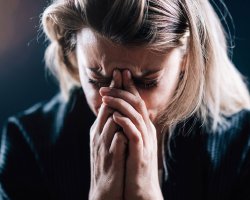Is it True When Drug Users Say, “I’m Only Hurting Myself”?

This is a line many families hear when they beg their addicted loved ones to accept their offer of rehab: “Leave me alone. I’m only hurting myself.” While every family member knows this not to be true, it can be difficult, if not impossible, to convince the drug user of this fact.
Family members can get so wrapped up in the lies, manipulation, and stories that the addicted person tells that they can lose sight of what is really going on.
It’s unfortunate but despite these harms, anyone addicted to alcohol or drugs is unlikely to be capable of recognizing the harm they are doing to themselves and others. Part of the tragedy of addiction is the degree of self-deception continued use causes. While some might say this shows a lack of moral character, that’s rarely the case. The web of deception has simply become so entangled that without help, there is no escape.
Some addicts report having moments of clarity, in which they realize the harm they are doing. Imagine after having destroyed your own life having to confront these situations:
January 2019: A review of published reports on the effects of parental opioid use revealed that parents addicted to opioids were more irritable, ambivalent and disinterested than sober parents. Their children experienced an increased risk of emotional and behavioral issues, poorer academic progress, and poor social skills.
July 2013: Three researchers published a compilation of information related to the effects of a substance use disorder on the unity, harmony, and health of a family unit. When a parent is a drug user, they report, an infant child will commonly lack all the cues that reassure him (or her) and enable him to feel safe and nurtured. This lack of nurturing creates stress that causes the child to be more susceptible to trauma and illness.
And of course, children of any age may be neglected, unfed, abused or removed from the home and forced to live with strangers as a result of parental drug problems.
November 2010: A UK assessment of the harms done by drugs determined that in terms of harming others rather than drug users, alcohol was the most harmful drug of all, while heroin and crack cocaine took second and third places. Next were methamphetamine and cocaine. Harms to others included physical, psychological and social harms.
This chart shows the results. The blue areas estimate the amount of harm to the drug users that each drug does and the red shows the amount of harm done to others.

This objective look at drugs of abuse clarifies what families, friends and community members know subjectively: The drug abuse of loved ones or other members of the community harms everyone.
Here’s some of the categories of harm used in this analysis.
- Drug-related mortality of a person other than the drug user resulting from assaults, homicide or traffic accidents. Incidents of domestic or child abuse or neglect also cause deaths.
- Injuries resulting from violence or neglect by the addicted person.
- Drug-related harm to health caused by contagion from the addicted person, for example, sexual transmission of HIV or hepatitis or diseases spread through discarded needles or human waste.
- Loss of tangibles, for example, families becoming homeless, loss of possessions to the drug user’s need for money.
- Damage to relationships causing stress, grief and heartbreak. Tragically, it is far from uncommon for a family member, especially a parent, to die from illness after dealing with a child’s addiction for years.
- Criminal acts committed by those who are addicted, depriving those who are not using drugs from their possessions or safety.
- Environmental damage, for example, toxins left behind after creating methamphetamine, or harm to a rural environment used for an illicit marijuana grow.
- Breakdown of family structure and damaged emotional and economic wellbeing of the family.
- Economic costs to the society resulting from the costs of law enforcement, healthcare, foster care, prisons and more.
- Harm to the fabric of the community so that it feels less safe and residents in the community feel less like they can gain enjoyment from their lives.

Of course, one well-known effect of the drug use of a parent is neonatal abstinence syndrome, the harmful and painful effect on a newborn when it’s born to a drug-using mother. In its first weeks of life, this poor child struggles with symptoms very similar to withdrawal symptoms including pain, sickness and inconsolable distress.
Similarly, fetal alcohol syndrome consists of a package of symptoms suffered by a baby born to a woman who drank during pregnancy. Signs of this condition can include altered facial features, deformities of joints, heart defects, vision difficulties, poor memory and trouble learning.
When a parent, sibling or close friend looks at an addicted loved one, they not only see the harm being done to that person, they know in their hearts about all these other types of damage being created. It is best and sometimes even life-saving for others when an addicted person can be convinced to accept the offer of rehab at the very first moment possible.
However, the crushing weight of the truth of just how much harm the addicted person is causing by their drug use is enough to spur on continued use to mask and numb the pain of that realization. This is a factor in why addiction can not be stopped by the individual him or herself and the family must often intervene to get the person to seek help.
These facts make it even more important to help those addicted to drugs find effective drug rehabilitation. Pointing out the harm they are doing may in fact make this harder. Instead, insist they get help so they can become happy healthy members of society.
Sources:
- https://www.ncbi.nlm.nih.gov/pmc/articles/PMC3725219/
- https://www.ncbi.nlm.nih.gov/pmc/articles/PMC6330457/
- https://www.thelancet.com/journals/lancet/article/PIIS0140-6736(10)61462-6/fulltext
- https://www.drugabuse.gov/related-topics/trends-statistics/infographics/dramatic-increases-in-maternal-opioid-use-neonatal-abstinence-syndrome
- https://www.mayoclinic.org/disC, eases-conditions/fetal-alcohol-syndrome/symptoms-causes/syc-2035290


 ®
®